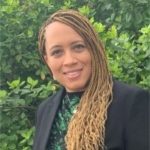
There is, without question, an increasing desire for leaders throughout the world to encourage and support practices that enable individuals and teams to engage in decision making in a way that cultivate a sense of worth and dignity. In their ongoing series, “Our Principles in Action: Appreciative Inquiry for Justice & Belonging”, Faith Addicott and Staceye Randle elaborate on the Appeciative Inquiry principle of Free Choice and how it “…might be the most powerful tool we have”, especially as it is essential to expressing who we are.
Faith Addicott | USA

Staceye Randle | USA

Psychologist Rollo May says, “a man or a woman becomes fully human only by his or her choices and his or her commitment to them. People attain worth and dignity by the multitude of decisions they make from day to day.” Our ability to choose is one of the things that makes us human, and opening freedom of choice to all people is inherent to inclusion and to democracy itself. The Appreciative Inquiry principle of Free Choice isn’t just about the fact that “people and organizations thrive when people are free to choose the nature and extent of their contribution”. Free choice “is an essential aspect of being human”.
Yet the experience of people who have been systematically marginalized and silenced, where oppression occurs daily as multitudes are excluded from decision making and representation in rooms where choices are made, belies the ethos of inclusion. Entrenched racism says “those aren’t really people” in its work to discredit and harm. This can be traced back to the history of people in the United States since its inception – indigenous people were brutalized as non-human and Black Americans were not human beings, but capital. Free Choice asks us to not only allow people to be a part of decisions that determine the course of change, but to acknowledge that failing to do so dehumanizes people and the organization (or world!) as a whole.
You may have heard the phrase, “nothing about us without us”. It is used to communicate the idea that no policy should be decided by any representative without the full and direct participation of members of the group(s) affected by that policy. It’s simple, catchy – and true. Imagine the power of having a system where people truly have free choice and the chance to be heard. Not just some people in the system, but all people in the system. What could that look like and how would that actually feel?
In our organizations, one of the most powerful and effective ways of centering diversity, equity and inclusion in our work is through building in choice. We can let go of the idea that all institutional knowledge rests on leaders’ shoulders, and instead consider diverse employees as co-creators in their own organizational experience. Perspectives from diverse cultural and experiential backgrounds enrich and improve our work when we allow for this co-creation, choosing inclusion over expertise.
Participation and the freedom to choose is essential to having people feel a sense of power. As we seek to weed out racism and exclusion in our world, leaning into the principle of Free Choice might be the most powerful tool we have. Free Choice asks long overdue questions about how we treat people – do we treat everyone as fully human, as inherently deserving of choice? If we start all Diversity, Equity, and Inclusion (DEI) efforts with a commitment to the human voice and choice of all people, we alter the fundamental lens of our work. We honor our shared humanity and unleash the power of shared dignity.
Intro by Keith Storace


